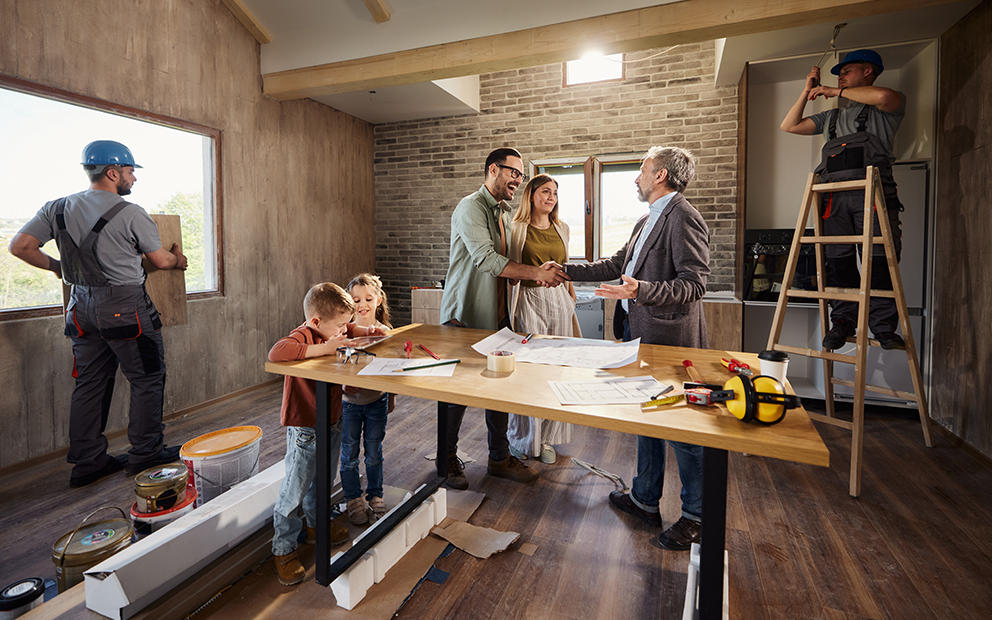
As the housing market goes through ebbs and flows, there will eventually be periods in which homes just aren’t being listed in abundance. If you’re a homebuyer, this can be frustrating, disappointing and, ultimately, feel hopeless. However, even when housing inventory isn’t at its peak, there are options for those seeking new home opportunities. While you may not be able to find your perfect home, there’s a possibility you could build it.
Building your home could be the solution to side-stepping a low inventory market. And with a construction loan, you can have a plethora of possibilities.
Benefits of Building a Home
While constructing a home from nothing can seem daunting, there are many advantages that can come with it. Here are a few:
Choice of Land and Location
When you build a home, you can decide on where exactly you want it built: The city, a rural area, the suburbs, etc. And if you choose to build near land that doesn’t belong to anyone, you may decide to purchase it in the future and expand on your home. The point is, whether you want an ocean or mountain view or absolutely must live near specific amenities and conveniences, you have a choice to set up shop where you want as long as there’s suitable land available.
Even if you don’t know exactly where you want to build your home, you can consult your builder who likely has the experience to advise you on good land choices.
Lower Maintenance
A newly constructed home means it was built to the most updated building standards, and everything in the home is brand new. This means you may be able to spend less time and money on maintenance or any large repairs that may come with an older home, such as a leaky roof or outdated water heater.
Customized and Personalized Design
Since you’re building a home from scratch, you have more control over all the details, from floorplans to the color of your front door. This is the type of customization you can’t get when you buy an already-built home and renovating such a property can be costly and tedious.
If you don’t want to put your architectural skills to the test on something as permanent as a home you’re going to live in, you can work with your builder to get floorplans the way you want them. They will also be able to advise you on what’s feasible, what’s not and what you may not have even considered.
Costs to Consider
You may be wondering whether building a home is worth the price as opposed to buying an already constructed home. That’s dependent on your own situation and needs. Before you decide to build, consider the following costs.
Construction Loan
Unless you’re paying for the full home out of pocket, it’s likely you’ll opt for a construction loan to finance the building of the property. A down payment for this type of loan is typically higher than other traditional mortgages, so you may have to pay around 20 percent down.
Builder Fees
An additional professional you need to account for when you’re building a home is the actual builder. They will be the ones in charge of helping you create the floorplans, overseeing coordination of the project and working on constructing the property.
Landscaping
One thing that may have escaped your mind while thinking about building a home is the area surrounding it. In many cases, unless you want vacant, unfinished land or piles of dirt surrounding your home, you’ll also need to invest in some landscaping, even if it’s as simple as putting down some grass.
What Can You Pay for with a Construction Loan?
A construction loan comes in a number of types for a number of uses. And depending on what you need, there are a couple ways you can use a construction loan. However, the items that can be paid with a construction loan can vary by lender so make sure you speak with yours to understand what’s feasible.
Land
You can use a construction loan to purchase the uninhabited land where you plan to build. However, you’ll need to find other financing for the actual construction of your home on the land.
Building Materials
While you won’t necessarily need to hunt down the building materials yourself (the builder will take care of that), you will be responsible for financing them through a construction loan. The builder will be able to withdrawal money from the loan as needed during the construction process.
Labor
Of course, builders don’t work for free. You can use a construction loan for any of their labor or hours worked.
Build or Buy?
The housing market is oftentimes unpredictable, and the home search can result in disappointment. However, if you have the time, energy and budget, building a home may be an excellent path to take. It leaves a lot of room for personal preference and customization, depending on you and your family’s (or future family’s) needs and you often have newer, updated plumbing, electrical, heating, ventilation, and air conditioning (HVAC), and technology, which typically requires less maintenance.
While the timeline to construct a new home can take longer than acquiring a mortgage for a home already built, it could be worth it in the end. So, should you build or buy? Weigh out the benefits to decide.
This information is intended for educational purposes only. Products and interest rates subject to change without notice. Loan products are subject to credit approval and include terms and conditions, fees and other costs. Terms and conditions may apply. Property insurance is required on all loans secured by property. VA loan products are subject to VA eligibility requirements. Adjustable Rate Mortgage (ARM) interest rates and monthly payment are subject to adjustment. Upon submission of a full application, a mortgage banker will review and provide you with the terms, conditions, disclosures, and additional details on the interest rates that apply to your individual situation.


